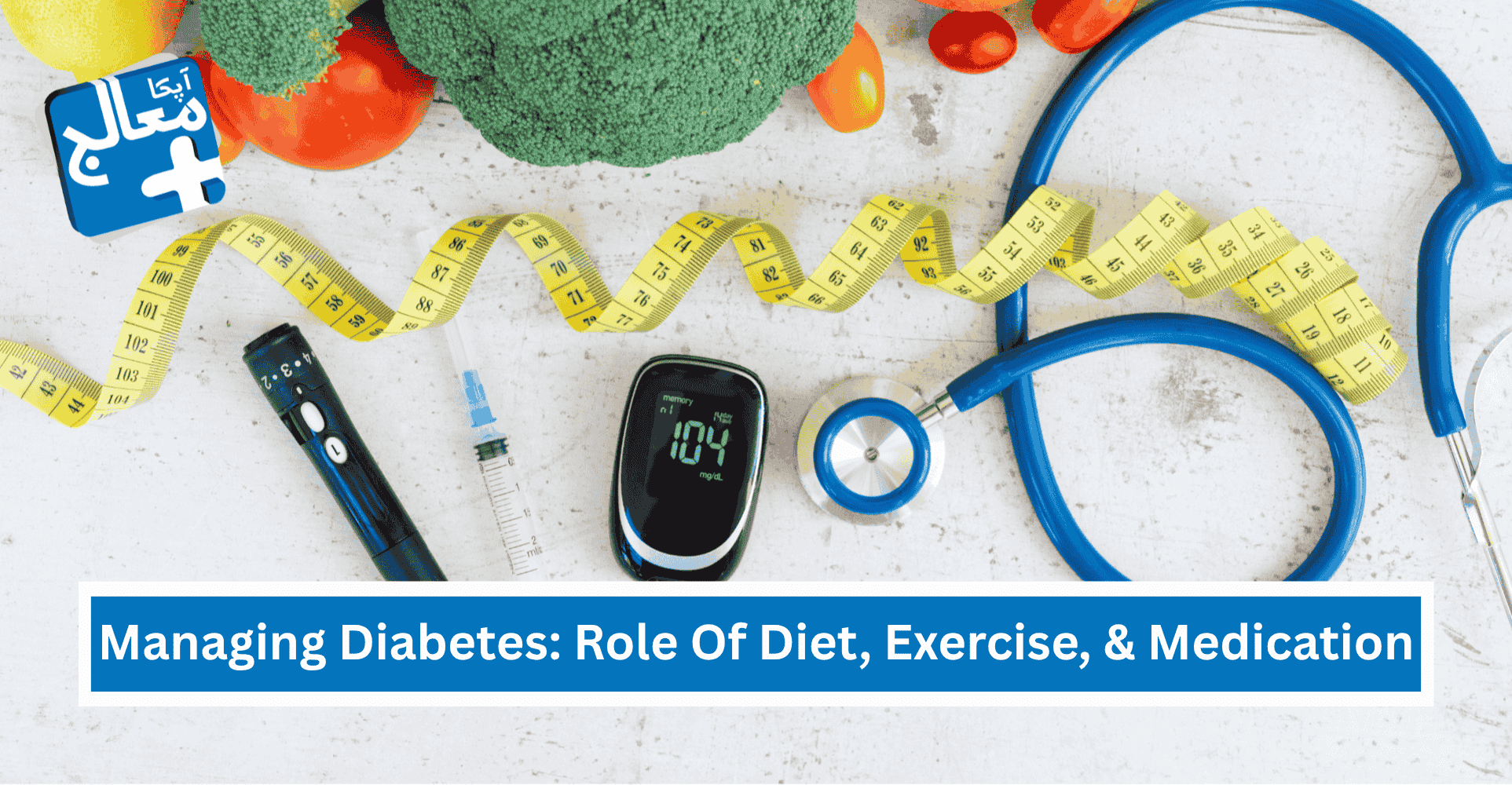Managing Diabetes: The Role Of Diet, Exercise, & Medication

Controlling diabetes is a persistent challenge that, if approached with proper knowledge and strong determination, can significantly improve your overall health and lifestyle. This is because high blood sugar levels pave the way for many diseases that silently damage your body from within before you even realize it.
Dr. Ann Albright, Director of the Division of Diabetes Translation at the CDC, said,
“Diabetes is a marathon, not a sprint. It takes daily effort, awareness, and patience to manage it well.”
That’s why today, let’s learn what diabetes is and how we can effectively control it.
What is Diabetes?
Diabetes in Urdu, also known as ذیابیطس, is a chronic disease in which your blood sugar level becomes very high. The food we eat is converted into sugar (glucose) and enters the bloodstream. When the sugar level rises, the pancreas (لبلبہ) releases a hormone called insulin. Insulin helps glucose enter the body’s cells, where it is used for energy. In short, sugar provides energy to our bodies.
In diabetes, the body either doesn't produce enough insulin or can't use it effectively. As a result, blood sugar levels remain high, which can lead to serious health problems such as heart disease, kidney issues, vision loss, and nerve damage.
You may also like: "Walking vs Running - Which is Better for Human Health"
Types of Diabetes
There are commonly three types of diabetes:
• Type 1 Diabetes: It is a genetic disease in which the immune system attacks the insulin-producing cells in the body, resulting in little or no insulin production.
• Type 2 Diabetes: Your body doesn’t make enough insulin, and/or your body’s cells don’t respond normally to the insulin, called insulin resistance.
• Gestational Diabetes: Occurs during pregnancy and usually goes away after childbirth, though it increases the risk of type 2 diabetes later in life.
• Latent autoimmune diabetes in adults (LADA): Like Type 1 diabetes, LADA also results from an autoimmune reaction, but it develops much more slowly than Type 1 and usually occurs at the age of 30.
• Maturity-onset diabetes of the young (MODY): It is also called monogenic diabetes and happens due to an inherited genetic mutation that affects how your body makes and uses insulin.
What Causes Diabetes?
The reason why your blood glucose levels are high differs depending on the type of diabetes. Causes of diabetes include:
• Family History: If diabetes is present in one or two generations of your family, it can run in the family and increase your risk of developing the condition.
• Obesity: When the fat level in the body is high, it can lead to insulin resistance, making it harder for the body to use insulin properly.
• High Blood Pressure and Cholesterol: These conditions are often linked to type 2 diabetes and can increase the risk of complications.
• High Intake of Sugar and Fat: An unhealthy diet is also associated with increased insulin resistance and a higher risk of developing diabetes.
• Lack of Physical Activity: A sedentary lifestyle contributes to insulin resistance and increases the chances of developing type 2 diabetes.
• Age: As you get older, especially after the age of 40, you begin to lose muscle mass, and your metabolism also slows down. In addition, aging cells may not respond to insulin as effectively as younger cells.
How to Manage Diabetes?
Effective diabetes management is all about balance—balancing food, physical activity, and medication to reduce the chances of developing complications.
According to the International Diabetes Federation,
“Diabetes is not the end of the road. It’s the beginning of a lifelong journey to self-care."
It includes:
• Regular Monitoring of blood sugar levels: It helps you understand how your body responds to food, activity, and medication. It allows timely adjustments to your lifestyle and treatment plan to keep diabetes under control.
• Healthy diet plan: Include fresh fruits, vegetables, fibre, whole grains, protein, lean meat, and dry fruits in your diet. Also, control your portion sizes and be mindful of how much of each food you are consuming. Avoid sweets and foods high in carbohydrates, as they can raise your blood sugar levels.
• Physical activity: It helps you lower blood glucose, blood pressure, and cholesterol levels. Being active may also help you get better sleep and improve your mood. Try to get at least 120 minutes of brisk walking every week.
• Maintain a Healthy weight: Maintaining a healthy weight helps improve insulin sensitivity and keeps blood sugar levels stable. Excess body fat, especially around the abdomen, increases the risk of insulin resistance and type 2 diabetes.
• Manage Stress: It is crucial, as high stress levels can lead to increased blood sugar. Practice relaxation techniques like deep breathing, meditation, or light exercise to keep stress under control.
• Regular checkups: It is important to monitor long-term blood sugar control and detect complications early. Make sure to keep up with A1C tests, eye exams, and kidney function tests as recommended by your doctor.
• Medication Management: It is key to keeping blood sugar levels stable. Always follow your doctor's instructions on when and how to take insulin or oral medications.
• Get Enough Sleep: Getting enough sleep may improve your mood, energy level, and blood glucose level. Most adults should aim for about 7 to 8 hours each night. Children and adolescents may need more sleep.
You may also like: "How Vitamin D Deficiency Affects Children - Signs, Causes, & Treatment"
5 Best Foods to Control Diabetes Naturally
These are the following foods help to control high blood sugar levels:
1. Dark Green Leafy Vegetables:
• These foods are low in calories and carbohydrates. They are rich in vitamins and minerals such as vitamins A, C, K, and folate; iron; calcium; and potassium.
• Like spinach, collards, kale, Broccoli, and Fenugreek leaves (Methi), etc.
2. Whole Grains:
• They have a low glycemic index, are high in fibre, improve insulin sensitivity, and support weight management.
• Brown rice, whole wheat, oats, quinoa, etc.
3. Low-Glycemic Fruits:
• Provide essential nutrients that provide stable energy levels without increasing sugar levels.
• Apples, berries, oranges, and pears, etc.
4. Healthy Fats:
• It helps to slow down glucose absorption, support heart health, reduce inflammation, and promote satiety.
• Avocados, nuts (almonds, cashews, pistachios, walnuts, peanuts), seeds (Sunflower seeds, Chia seeds, Soybean, and tofu), olive oil, etc.
5. Lean Proteins:
• High in protein and low in fat, it maintains your muscle mass and keeps you fuller for longer.
• Skinless chicken breast, eggs, fish, low-fat dairy, etc.
In the words of Halle Berry:
"You can live with diabetes. It’s about managing it properly and being aware."
Importance of Exercise to Manage Diabetes
Exercise is a cornerstone of diabetes management. It helps in:
• Lowering Blood Sugar: Physical activity allows muscles to use glucose more efficiently.
• Weight Management: Helps in reducing insulin resistance.
• Improving Mood: Reduces stress and improves overall well-being.
• Enhancing Insulin Sensitivity: This makes insulin work better in the body.
Aim for at least 150 minutes of moderate-intensity aerobic activity per week, such as brisk walking, swimming, or cycling.
When to Take Diabetes Medication?
Timing and consistency are crucial when it comes to diabetes medications:
• Oral Medications: Usually taken before or after meals, depending on the type.
• Insulin Injections: Must be timed with meals or taken at specific intervals.
• Monitoring Required: Keep track of sugar levels to avoid hypoglycemia.
Always follow your doctor’s instructions and never self-adjust your dose without guidance.
Enjoy to know: "15 Shocking Health Benefits of Sex - Reasons You Should Have Sex"
Summary
In summary, managing diabetes is not something that can be done in just a few days; it requires consistency, self-awareness, and ongoing lifestyle maintenance. You need to create a personalized management plan based on your specific condition. With the right lifestyle and medication, you can keep it well under control.
If you have diabetes and need proper guidance, you can consult with the best diabetologist or endocrinologist in Pakistan by visiting www.apkamuaalij.com. For a quick consultation, dial 042-32377001 and book your doctors through Apka Muaalij, the best telehealth platform in Pakistan.
Most Frequently Asked Questions (FAQs)
What should you not eat with diabetes?
Avoid sugary drinks, refined carbs, trans fats, and heavily processed snacks.
How does walking lower blood sugar?
Walking increases insulin sensitivity and helps muscles absorb glucose.
How often should you check your blood sugar?
At least twice a day for most type 2 diabetics; more often if using insulin.
How can you prevent diabetes?
Maintain a healthy weight, eat balanced meals, and stay physically active.
What is the best way to control diabetes?
A mix of regular exercise, healthy eating, monitoring, and prescribed medication.
What are the 5 signs your blood sugar is too high?
Frequent urination, excessive thirst, fatigue, blurred vision, and slow-healing wounds.

Dr. Bisma Shehzadi
Dr. Bisma Shehzadi, Pharm.D, RPh, is working as a professional seasoned content writer with 4 years of experience in healthcare and wellness writing. With a strong pharmaceutical background and clinical knowledge, she creates research-driven, search-optimized articles that simplify complex medical topics. Her writing enables her to craft content that educates, promotes wellness, and supports healthcare initiatives among online users and readers.